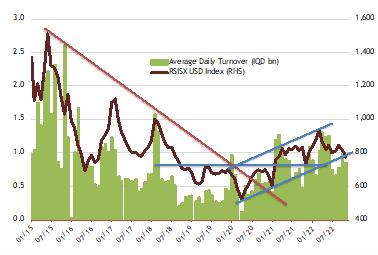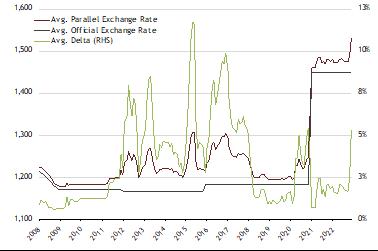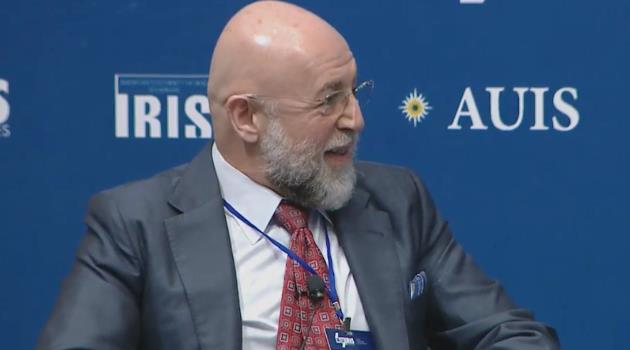(MENAFN- Iraq Business News)
By Ahmed Tabaqchali, Chief Strategist of AFC Iraq Fund .
Any opinions expressed are those of the author, and do not necessarily reflect the views of iraq business news .
Iraq Market Report: Currency Upheavals Disrupt Market Activity
The market, as measured by the Rabee Securities RSISX USD Index, was down 1.0% for the month and down 3.8% for the year.
For the second month in a row, the decline in the parallel market's price of the Iraqi Dinar (IQD) versus the US Dollar (USD) negatively affected the market's performance. But this month it went beyond exaggerating the market's decline by reversing the index's 0.7% increase in IQD terms to a decline of 1.0% in USD terms.
Putting the currency decline over the last two months into perspective, for the year the index was down 0.8% in IQD terms, and down 3.8% in USD terms.
The volatility of the currency during the month dampened trading activity on the Iraq Stock Exchange (ISX). The index at year end is just under the low end of its 32-month up-trending channel (chart below) - which still supports the market's positive technical picture as discussed here in the past few months. The macroeconomic fundamentals discussed here seven months ago argue that this uptrend will likely remain in force; however, its upward slope might moderate or even go sideways, as this month's action suggests.
The 2023 budget proposal, expected to be submitted by the government to parliament in January, with a hoped for ratification a couple of months later, is expected to provide the catalyst for the market's next move - especially as all indications suggest that it would be another expansionary budget as discussed here a few months ago.
RSISX USD Index versus Average Daily Turnover

(Source: Iraq Stock Exchange, Rabee Securities, AFC Research, data as of December 29th)
In local currency terms, most of the index's constituents were down for the year, with the exception of the Bank of Baghdad (BBOB) which was up 33.0%, Al Mansour Bank (BMNS) up 21.6%, while Kharkh Tour Amusement City (SKTA) was flat. The decliners were led by Al-Mansour Pharmaceutical Industries (IMAP) down 28.5%, Baghdad Soft Drinks (IBSD) down 23.3%, the Commercial Bank of Iraq (BCOI) down 19.4%, Iraqi for Seed Production (AISP) down 12.5%, the National Bank of Iraq (BNOI) down 10.6%, Al-Kindi of Veterinary Vaccines and Drugs (IKLV) down 10.3%, and AsiaCell (TASC) down 3.2%.
The ISX does not adjust stock prices for dividends and as such these figures represent total return figures. Five of the index's ten constituents declared cash dividends during the year, with dividend yields at the time of announcements of 18.4% for BCOI, 11.8% for TASC, 8.0% for BMNS, 5.3% for IBSD, and 3.6% for BBOB. On the other hand, AISP declared a combination of a 22.1% stock dividend and a 5.2% cash dividend at the time of the announcement, and BNOI declared an 8.0% stock dividend. Rabee Securities notes that 21 out of the ISX's 103 listed companies declared cash dividends with dividend yields, at the time of the announcements, in a range of 0.6% and 18.4%, with an average dividend yield of 4.3%, and a median dividend yield of 2.8%.
Currency Volatility
The Central Bank of Iraq (CBI) as part of an ongoing process of encouraging the move towards the adoption of banking, and away from the informality that dominates economic activity, implemented in mid-November new requirements to those for its provisioning of US Dollars (USD) for importers. These requirements would bring the country's cross-border fund transfers in-line with global standards, that require a high level of transparency; however, they represent a seismic shift to the country's cash dominated economy, in which large informal sectors drive the bulk of economic activities. As such, the introduction of the new regulations had an immediate detrimental effect on the volumes of the CBI's daily USD-Iraqi Dinar (IQD) transactions for cross border fund transfers. The decreased volumes versus the continued high demand for USD to satisfy the need for imports, led to increases in the market price of the exchange rate of the USD versus the IQD. Initially the increase for November was 2.9%, but as USD-IQD transaction volumes continued to decline, the increases in the exchange rate worsened with the onset of the holiday season, with an intra-day peak increase of around 6.0% just after Christmas - with the ensuing panic amplified by misconceptions, rumours, and misinformation.
The CBI, in response, introduced a number of measures to calm the market, and to further the adoption of banking, such as lowering its commission for USD purchases from 10 to five basis points for: (1) importers who use letters of credit (LCs) for imports of goods and services; and (2) for individuals who use bank cards for their USD purchases for travel needs instead of cash. Other welcome measures introduced by the CBI were terminating its reports to the customs and the tax authorities on all USD transfers for imports - in the past these reports, paradoxically, increased economic informality given the outdated procedures and bureaucratic nightmares of the customs and tax authorities. The combination of the CBI's measures eased the market's panic somewhat, and the market price of the USD versus the IQD ended the month with an increase of 2.4%.
These dynamics can be seen in the chart below. The first half represent volumes of the CBI's daily USD-IQD transactions (bank transfers to facilitate the imports of goods and services as indicated by green bars, and to satisfy the need for physical USD for Iraqi's travelling abroad as indicated by the dark maroon bars). While the second half represents the official exchange rate of the USD versus the IQD (dark grey line), the market price of the USD versus the IQD (dark maroon line), and the premium of the market price of the USD/IQD exchange rate versus the official rate (delta or green line).
Volumes in CBI's USD-IQD Transactions versus the USD/IQD Exchange Rates

(Source: Central Bank of Iraq (CBI), data as of December 29th; data are daily closing prices)
The panic in the market, spurred by populist rhetoric, was focused on the high absolute level of the market price of the USD/IQD exchange rate, which in turn was the main reason for the disruption to economic activity, and to the trading activity on the ISX. However, the real measure of the market price is not its absolute level but its premium over the official price of the USD/IQD exchange rate. This premium increased to about 8.4% at the height of the panic (intra-day, it was over 10.0%), which while high, is much lower than the 14.2% level it reached around the 23.0% devaluation of the IQD versus the USD in late December 2020 (chart above; and lower than other periods of the currency's upheavals (chart below).
In the near term, the premium is likely to settle in a range higher than current levels, given the continued strong demand for imports, the high levels of informality in economic activities- especially imports, and the time needed for the market to adjust to the increased levels of transparency demanded in cross-border fund transfers. The economy in the past adjusted to much higher premiums than current levels, and the adjustments eventually led to lower premiums (chart below) - a repeat of such adjustments this time will bring with it the benefits of increased adoption of banking.
USD/IQD Monthly Exchange Rates

(Central Bank of Iraq (CBI), data as of December 29th; data are averages of the daily closing prices of the exchange rates for a given month, and as such should not be confused with the daily closing prices in chart above)
Irrespective of the negative effects of the currency, the 2022 performance of the Iraqi equity market, as measured by the RSISX USD Index, is well ahead of global benchmarks, signifying the diversification benefits of the Iraqi equity market which has a low correlation with global markets, especially during this period of global market volatility and macroeconomic uncertainty.
Please click here to download ahmed tabaqchali's full report in pdf format .
Mr Tabaqchali (@amtabaqchali ) is the Chief Strategist of the AFC Iraq Fund, and is an experienced capital markets professional with over 25 years' experience in US and MENA markets. He is a Visiting Fellow at the LSE Middle East Centre, Senior Fellow at the Institute of Regional and International Studies (IRIS), and a Senior Non-resident Fellow at the Atlantic Council. He is also a board member of Capital Investments, the investment banking arm of Capital Bank in Jordan.
His comments, opinions and analyses are personal views and are intended to be for informational purposes and general interest only and should not be construed as individual investment advice or a recommendation or solicitation to buy, sell or hold any fund or security or to adopt any investment strategy. It does not constitute legal or tax or investment advice. The information provided in this material is compiled from sources that are believed to be reliable, but no guarantee is made of its correctness, is rendered as at publication date and may change without notice and it is not intended as a complete analysis of every material fact regarding Iraq, the region, market or investment.























Comments
No comment